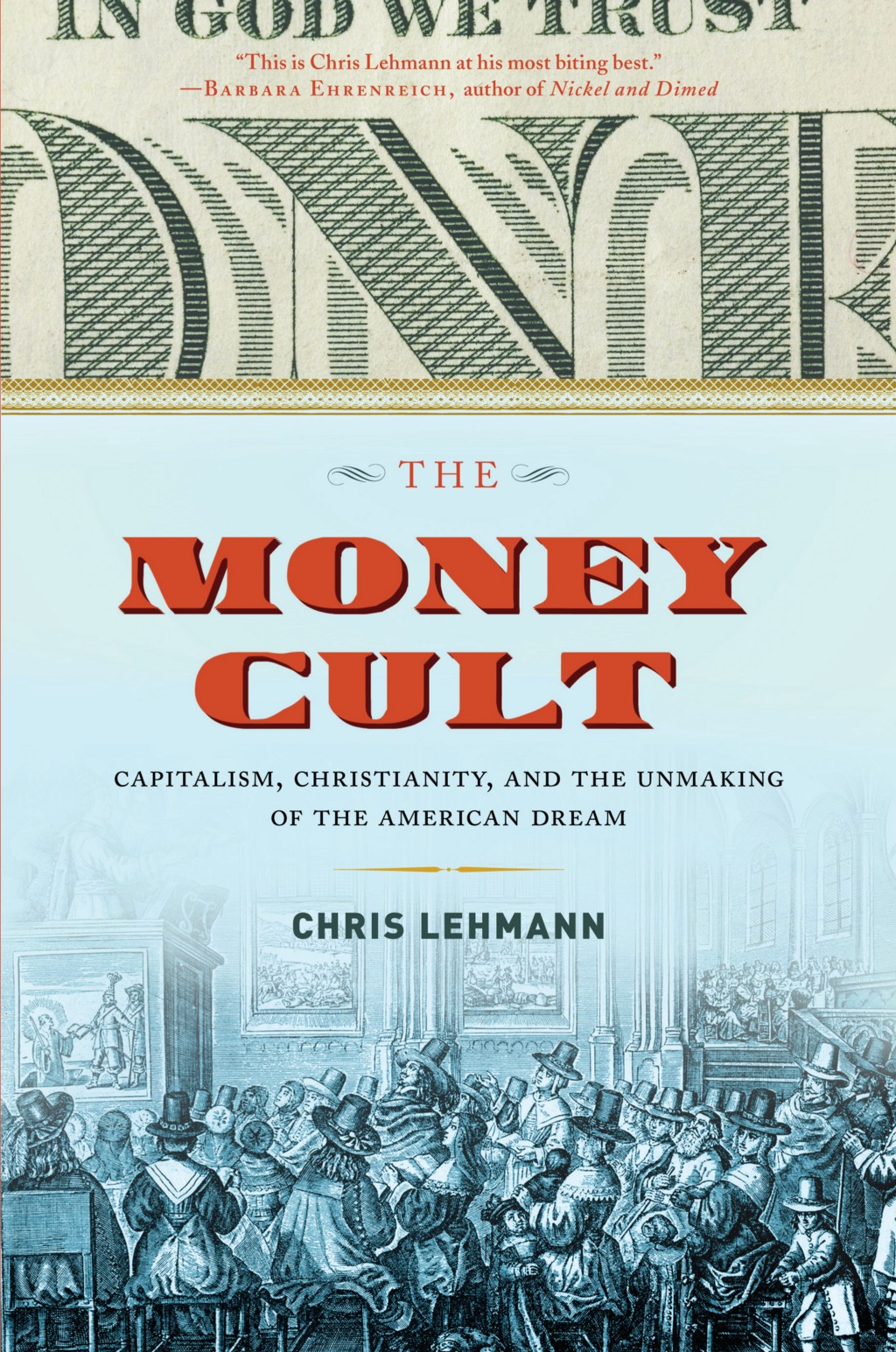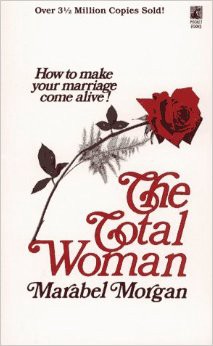The Business Manual For The Surrendered Wife
An excerpt from Chris Lehmann’s ‘The Money Cult’
We are very happy to present the following adaptation from Awl pal Chris Lehmann’s The Money Cult: Capitalism, Christianity, and the Unmaking of the American Dream. A “sweeping and accessible history that traces American Christianity from John Winthrop to the rise of the Mormon Church to the triumph of Joel Osteen,” The Money Cult argues that “capitalism has always been entangled with religion, and so today’s megapastors aren’t an aberration–they’re as American as Benjamin Franklin.” Speaking of capitalism, here’s where you exchange your money for the book.

Family Values
Ever since the early nineteenth century, the main run of Protestant believers in America were women — a demographic trend that, if anything, made it all the more incumbent on the traditionally male leaders of the mainline Protestant world to defend and vindicate their own elevated standing. In other words, to be a faithful Protestant believer in America’s industrial age usually meant to embrace the spiritual authority of accomplished male leaders in the traditional alpha mode.
This all began to change during the seventies and eighties. As Bethany Moreton shows in her incisive study To Serve God and Wal-Mart, the overlapping economic crises of the seventies triggered a core re-evaluation of the innermost productive logic of the Protestant work ethic — and this revision would recast the gendered ideals of American labor in a new, evangelically tinged light. This pivotal shift took place under the mantle of a new management theory called servant leadership, and Moreton lays out its gender significance in sharp and suggestive terms:
During the 1970s and 1980s, the eclipse of production by the service economy heightened Christian fears that the wellsprings of American virility were drying up: where would real men develop if work came to look too much like home? How could male authority survive the ascendance of service work and the mobilization of women as wage earners? The experience of service labor itself offered the basis for a new ideology that met these challenges. Christened ‘servant leadership’ by its formal adherents, this new ethic glorified the formerly humble, feminine reproductive labor against which the old manly producerism had defined itself. Taken up by Christian opinion-makers and embraced by many families in the pews, servant leadership offered something to everyone. Service workers found a measure of respect denied them by the heroic narratives of industry. Managers gained a new claim to authority just as their older ones came to look increasingly implausible. Christian husbands enhanced their status at home despite the loss of the bread-winner’s mantle. And many evangelical women found wifely ‘submission’ a small price to pay for men’s reinvestment in the domestic sphere.
In this new dispensation, evangelical women were to benefit rhetorically from Second Wave feminist calls for greater recognition of their labor and selfless service, while also claiming for themselves a notional equality of parental authority. But it was also taken for granted in the servant-led household that all the adult parties must cleave to the traditional biblical teaching of wifely submission within the power dynamics of married life. Self-help books such as Marabel Morgan’s The Total Woman — which clocked in as the bestselling nonfiction book of 1974 with more than 10 million copies sold — brimmed with modern tips for reviving a marriage’s flagging sexual momentum. (Morgan won a great deal of titillated media renown for advising women to surprise their husbands as they returned at the end of the workday by greeting them at the door clad in nothing but Saran wrap.)
Morgan’s sunny celebration of the erotic charges to be won from the surrendered wife’s confinement in the domestic sphere was not merely an exhortation for her readers to take traditional male authority at face value. In her alliterative four-point scheme of successful marital submission — “Accept Him,” “Admire Him,” “Adapt to Him,” and “Appreciate Him” — Morgan seamlessly takes up the rhetoric of service management in the context of the more intimate marital challenges of optimizing sexual and emotional self-expression and shoring up a partner’s self-esteem.
For all the heavy-breathing attention it won in the mainstream press for its sexual counsel, The Total Woman was at bottom a domestic business manual. Its first chapter, “The Organization Woman,” directed unhappy wives to conquer their sense of creeping marital stagnation and malaise with a battery of to-do lists, prioritizing undone domestic chores while also freeing up time for self-pampering in front of the vanity and dramatic seduction scenes at the end of a frazzled husband’s workday. Morgan dubbed this regimen “Your $25,000 Plan,” since it stemmed from a piece of managerial folklore in which steel-and-investment titan Charles Schwab rewarded a female management consultant with that sum for presenting him with a simple system for prioritizing the tasks of his workday. “If it works in a steel factory,” Morgan wrote, “it will work for you in your house factory.”

To judge by Morgan’s wildly successful counsel, enterprising and ambitious women were finding that the challenge of navigating a traditionally patriarchal marriage had turned out to be a lot like the challenge of preserving one’s self-worth and dignity in the far more impersonal realm of the market. And much like the bureaucracy of the postindustrial workplace, the family unit usually relies to an inordinate degree on the junior executive’s superior initiative to jump-start the more constitutionally sluggish energies of company leadership. It’s true, Morgan conceded, that it can be exasperating for the wife in a traditional marriage to be continually initiating the rituals of emotional appreciation and admiration demanded by the breadwinner spouse. But that outlook changes once women can “see they have certain strengths that a man doesn’t have. It’s a great strength, not a weakness, to give for the sake of giving. It is in your nature to give.”
The Total Woman abounds with reminders that the female partner in marriage, while subordinate in executive authority, possesses the greater hands-on qualities of servant leadership. While their rigid, achievement-minded spouses are often emotionally inaccessible or unable to adopt more flexible views of their roles in the home and workplace, women are able to make marriages and the men in them “come alive” — as the book’s subtitle had it — with the power of their faith. As Morgan explains, you, the emotional manager of the domestic sphere, “have the power to lift your family’s spirit or bring it down to rock bottom.”
And like any service-minded superhero, the Total Woman is charged ultimately with using her powers for good: When the nominal family president’s self-esteem appears to be waning, the task is simple: “put his tattered ego back together with compliments.” Very much in contrast to the self-improving spirit of the nineteenth century’s evangelical revolution, the Total Woman gospel is largely a great project of emotional and sexual reclamation — to undo, with the miraculous power of emotionally engaged female faith, the abrasive damage wrought upon the fragile male ego by the impersonal rounds of market competition and its drastically diminishing returns.
The tremendous success of Morgan’s self-help tract launched a thriving cottage industry in marriage and intimacy manuals for evangelical readers. In 1976, Tim and Beverly LaHaye issued The Act of Marriage, a sex-advice guide for Christian couples, which also teemed with surprisingly straightforward, informative, and quasi-clinical discussions of the act in question; it sold more than 2.5 million copies — and unlike Morgan’s book, remains in print today. Beverly LaHaye followed soon thereafter with The Spirit-Controlled Woman, her own tract laying out the many dynamic and erotic charges that women can bring to conventionally patriarchal unions.
In Fascinating Womanhood, meanwhile — originally published in 1964, but reissued in 1975 to capitalize on the exploding evangelical market for marriage-advice books — Helen Andelin made the demands of the market-wounded vanity of men even more explicit, in a list of the typical husband’s essential “needs”:
1. His need to be accepted at face value;
2. His need for admiration;
3. His sensitive masculine pride;
4. His need for sympathetic understanding;
5. His need to be No. 1;
6. His need to serve as the guide, protector, and provider; to feel needed in this role, and to excel women in doing so.
In the wake of the Total Woman craze, media commentators and religious figures alike spent a great deal of time debating the ongoing challenge of squaring conventional evangelical piety with the more unvarnished demands for gender equality, in the domestic sphere and the workforce alike, coming from the women’s liberation movement. Meanwhile, the women on the evangelical side of the divide in this foundational moment in American cultural warfare were, of course, hardy tribunes of “family values.”
But to dwell obsessively on this familiar pitched battle over feminist right and family obligation — choice versus submission, self-assertion over caregiving, career in opposition to “family” — as our culture has now for the better part of half a century, is to miss at least half of the picture. For as the testimony of Marabel Morgan and her cohort of defenders of evangelical womanhood made abundantly clear, they didn’t see any contradictions between liberal individualist choice and the more mutual obligations of family life. If anything, their vision of the family was cribbed to a strikingly self-conscious degree from the psychological mandates of advancement within corporate America.
In reorganizing evangelical families, the insurgent Total Women of the seventies were cannily spiritualizing the routines of a domestic sphere already groaning under the logic of market domination — just as the former Episcopalian priest Richard Bolles — author of the mega-bestselling job-seekers’ manual What Color Is Your Parachute? — was retooling the stigmatized and shame-inducing experience of unemployment along softer-focus lines of a divinely sanctioned moment of redemption in the career-long unfolding of the job seeker’s human potential.
A new chapter was beginning in the odyssey of the Protestant ethic — and its posture toward the world of capitalist enterprise was now paradoxically suffused in joy. Far from transforming working and professional life into a vast, edifying spiritual quest, the revolution in the seventies and eighties political economy of the spirit turned the formerly market-resistant preserves of personal life into a long succession of jobs, that one had to apply for over and over again.
